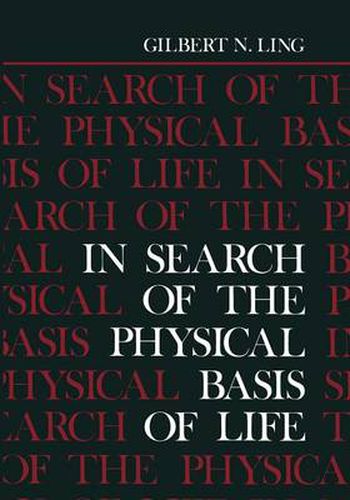Readings Newsletter
Become a Readings Member to make your shopping experience even easier.
Sign in or sign up for free!
You’re not far away from qualifying for FREE standard shipping within Australia
You’ve qualified for FREE standard shipping within Australia
The cart is loading…






This title is printed to order. This book may have been self-published. If so, we cannot guarantee the quality of the content. In the main most books will have gone through the editing process however some may not. We therefore suggest that you be aware of this before ordering this book. If in doubt check either the author or publisher’s details as we are unable to accept any returns unless they are faulty. Please contact us if you have any questions.
It is highly probable that the ability to distinguish between living and nonliving objects was already well developed in early prehuman animals. Cognizance of the difference between these two classes of objects, long a part of human knowledge, led naturally to the division of science into two categories: physics and chemistry on the one hand and biology on the other. So deep was this belief in the separateness of physics and biology that, as late as the early nineteenth century, many biologists still believed in vitalism, according to which living phenomena fall outside the confines of the laws of physics. It was not until the middle of the nineteenth century that Carl Ludwig, Hermann von Helmholz, Emil DuBois-Reymond, and Ernst von Briicke inaugurated a physicochem ical approach to physiology in which it was recognized clearly that one set of laws must govern the properties and behavior of all matter, living and nonliving . . The task of a biologist is like trying to solve a gigantic multidimensional crossword fill in the right physical concepts at the right places. The biologist depends on puzzle: to the maturation of the science of physics much as the crossword solver depends on a large and correct vocabulary. The solver of crossword puzzles needs not just a good vocabulary but a special vocabulary. Words like inee and oke are vitally useful to him but are not part of the vocabulary of an English professor.
$9.00 standard shipping within Australia
FREE standard shipping within Australia for orders over $100.00
Express & International shipping calculated at checkout
This title is printed to order. This book may have been self-published. If so, we cannot guarantee the quality of the content. In the main most books will have gone through the editing process however some may not. We therefore suggest that you be aware of this before ordering this book. If in doubt check either the author or publisher’s details as we are unable to accept any returns unless they are faulty. Please contact us if you have any questions.
It is highly probable that the ability to distinguish between living and nonliving objects was already well developed in early prehuman animals. Cognizance of the difference between these two classes of objects, long a part of human knowledge, led naturally to the division of science into two categories: physics and chemistry on the one hand and biology on the other. So deep was this belief in the separateness of physics and biology that, as late as the early nineteenth century, many biologists still believed in vitalism, according to which living phenomena fall outside the confines of the laws of physics. It was not until the middle of the nineteenth century that Carl Ludwig, Hermann von Helmholz, Emil DuBois-Reymond, and Ernst von Briicke inaugurated a physicochem ical approach to physiology in which it was recognized clearly that one set of laws must govern the properties and behavior of all matter, living and nonliving . . The task of a biologist is like trying to solve a gigantic multidimensional crossword fill in the right physical concepts at the right places. The biologist depends on puzzle: to the maturation of the science of physics much as the crossword solver depends on a large and correct vocabulary. The solver of crossword puzzles needs not just a good vocabulary but a special vocabulary. Words like inee and oke are vitally useful to him but are not part of the vocabulary of an English professor.